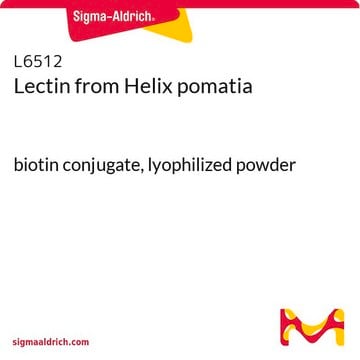L1516
Lectin from Wisteria floribunda
buffered aqueous solution, biotin conjugate
Synonym(s):
Wisteria floribunda agglutinin, WFA
About This Item
Recommended Products
conjugate
biotin conjugate
Quality Level
form
buffered aqueous solution
packaging
pkg of 2 mg active conjugate
storage temp.
2-8°C
Looking for similar products? Visit Product Comparison Guide
Biochem/physiol Actions
Packaging
Preparation Note
Analysis Note
Storage Class Code
10 - Combustible liquids
WGK
WGK 2
Flash Point(F)
Not applicable
Flash Point(C)
Not applicable
Personal Protective Equipment
Certificates of Analysis (COA)
Search for Certificates of Analysis (COA) by entering the products Lot/Batch Number. Lot and Batch Numbers can be found on a product’s label following the words ‘Lot’ or ‘Batch’.
Already Own This Product?
Find documentation for the products that you have recently purchased in the Document Library.
Customers Also Viewed
Articles
Find the right lectin for your research with our lectin selection guide, organized by lectin source/species, carbohydrate specificity, blood group specificity, and more.
Find the right lectin for your research with our lectin selection guide, organized by lectin source/species, carbohydrate specificity, blood group specificity, and more.
Find the right lectin for your research with our lectin selection guide, organized by lectin source/species, carbohydrate specificity, blood group specificity, and more.
Find the right lectin for your research with our lectin selection guide, organized by lectin source/species, carbohydrate specificity, blood group specificity, and more.
Our team of scientists has experience in all areas of research including Life Science, Material Science, Chemical Synthesis, Chromatography, Analytical and many others.
Contact Technical Service









